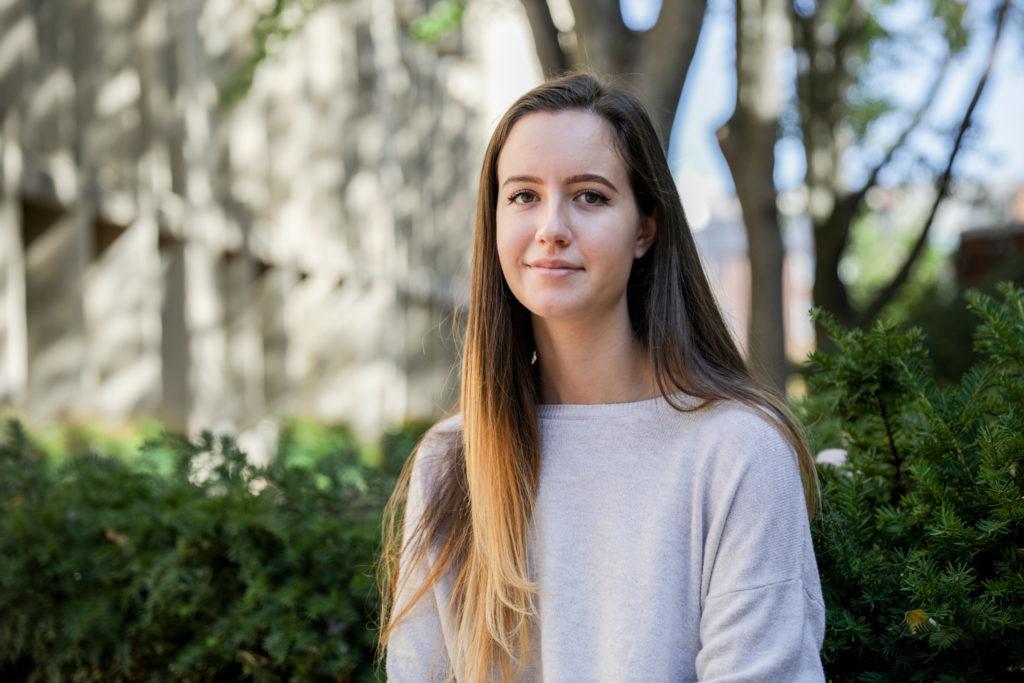Updated: Oct. 23, 2017 at 12:14 p.m.
As the University continues to focus on attracting racially and socioeconomically diverse applicants, students and professors said intellectual diversity is often left out of the conversation.
Conservative students said they are often outnumbered and even ignored in political discourse with other groups of students in classes and in the larger community and that officials have not focused on increasing representation of conservative students on campus.
Costas Solomou, the dean of undergraduate admissions, said the University does not ask about students’ political affiliations on its application and that most students don’t divulge their political preferences in their applications.
Recently, the admissions office has been seeking to recruit diverse groups of students, participating in recruitment trips to cities with large multicultural populations and adopting a test-optional application policy two years ago as part of a broader effort to attract a more socioeconomically diverse student body.
“We believe that enrolling high-achieving students who bring diverse perspectives, backgrounds and interests contributes to creating more interesting and educationally enriching experiences in and out of the classroom for all of our students, as well as for the entire University community,” Solomou said in an email.
“If you’re going to school with people who think the exact same way you do and just only think in that way, you’re really missing out on so much more you can learn.”
In the wake of last year’s tumultuous presidential election, 8 percent of private colleges and 9 percent of public colleges reported that they are actively attempting to recruit conservative students, according to a survey of admissions directors by Inside Higher Ed. Twenty-eight percent of private colleges and 52 percent of public colleges are sending recruitment teams to rural areas or places with high populations of low-income white students, two typically conservative groups, according to the survey.
Warren Wilson College, a private university near Asheville, N.C., announced earlier this month that it would seek to recruit conservative students by bringing conservative speakers to campus and recruiting from rural areas with high conservative populations, according to Education Dive.
Higher education – and the stereotypically liberal academia – has drawn the ire of conservatives in recent years. In a July survey by the Pew Research Center, 58 percent of Republicans and Republican-leaning independents said colleges and universities are having a negative effect on the country, a number that has grown substantially since 2015.
Conservative-leaning student organization leaders on campus said liberal students often dominate political campus conversations, dampening political discourse. Those students said they often feel excluded and don’t speak up out of their fear that their viewpoint will be interpreted as discriminatory against minority groups.
Senior Aleksandra Srdanovic, the former president of GW’s Young Americans for Liberty chapter, said students often get trapped in their own “bubbles” and don’t interact with people who think differently than they do. That can be dangerous for intellectual development because then students don’t challenge each other’s thoughts, she said.
“At GW, we pride ourselves on saying everyone is welcome here no matter their gender, their race, how they identify themselves,” she said. “If we’re going to stay true to that, I think we have to also apply it to political ideology.”
Although she doesn’t think GW should specifically recruit conservative students, Srdanovic said the school should do more to promote civil dialogue on campus.
Juliette Erath, the right-wing co-chair of the Bipartisan Women’s Supper Club, a bipartisan student organization started earlier this year, said on a liberal campus, conservative students can be labeled racists, homophobes and xenophobes to discredit their opinions. She said the tensions reached their highest during last year’s presidential election and early on in the Trump administration.
“The whole point of college is to see different perspectives and to meet new people, and if you’re going to school with people who think the exact same way you do and just only think in that way, you’re really missing out on so much more you can learn,” she said.
But junior Keiko Tsuboi, the chapter leader of Young Progressives Demanding Action, said that while GW is a liberal campus, it’s not necessarily a negative. She said the progressive mentality on campus means that more multicultural students are accepted and represented.
Many multicultural students don’t feel connected to a conservative ideology, she said, because the movement has traditionally been dominated by white members.
“The University experience should be about developing political preferences – not expressing them.”
“They can neither have actual diversity of people from different backgrounds, socioeconomic levels coming to campus, or they can go for this myth of intellectual diversity even though it already exists on college campuses, and college campuses have always furthered new ideas and broken new ground,” she said.
Henry Nau, a political science and international affairs professor who served in former President Ronald Reagan’s administration, said the main purpose of a university is to promote critical thinking and education. He said conservative views and liberal views aren’t equally represented at GW.
“We are very interested in trying to bring our admission policy to include racial minorities, to include gender minorities,” he said. “We should probably also consider improving the balance of political debate, political thought and political conviction on our campuses.”
But Robert Stoker, a professor of political science and public Policy and public administration, said he doesn’t consider GW to be a liberal campus because there are active political organizations on both sides.
“It’s true that having a variety of different of sorts of perspectives helps people to develop these views, but I don’t think the idea of college’s mission should be based around trying to build a comfortable community for different, cohesive students,” he said. “The University experience should be about developing political preferences – not expressing them.”
Sarah Chadwick, Dani Grace, Sarah Roach and Meredith Roaten contributed reporting.
This post was update to reflect the following correction:
The Hatchet incorrectly spelled Aleksandra Srdanovic’s first name. It is now spelled correctly. We regret this error.





